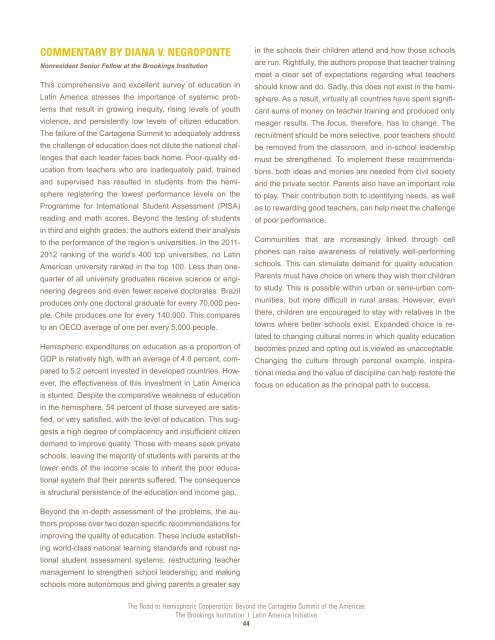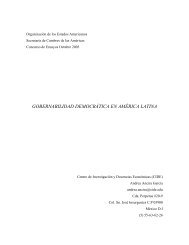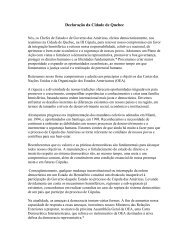The Road to Hemispheric Cooperation: Beyond the Cartagena
The Road to Hemispheric Cooperation: Beyond the Cartagena
The Road to Hemispheric Cooperation: Beyond the Cartagena
You also want an ePaper? Increase the reach of your titles
YUMPU automatically turns print PDFs into web optimized ePapers that Google loves.
COMMENTARy by DIANA v. NEgROPONTE<br />
Nonresident Senior Fellow at <strong>the</strong> Brookings Institution<br />
This comprehensive and excellent survey of education in<br />
Latin America stresses <strong>the</strong> importance of systemic problems<br />
that result in growing inequity, rising levels of youth<br />
violence, and persistently low levels of citizen education.<br />
<strong>The</strong> failure of <strong>the</strong> <strong>Cartagena</strong> Summit <strong>to</strong> adequately address<br />
<strong>the</strong> challenge of education does not dilute <strong>the</strong> national challenges<br />
that each leader faces back home. Poor-quality education<br />
from teachers who are inadequately paid, trained<br />
and supervised has resulted in students from <strong>the</strong> hemisphere<br />
registering <strong>the</strong> lowest performance levels on <strong>the</strong><br />
Programme for International Student Assessment (PISA)<br />
reading and math scores. <strong>Beyond</strong> <strong>the</strong> testing of students<br />
in third and eighth grades, <strong>the</strong> authors extend <strong>the</strong>ir analysis<br />
<strong>to</strong> <strong>the</strong> performance of <strong>the</strong> region’s universities. In <strong>the</strong> 2011-<br />
2012 ranking of <strong>the</strong> world’s 400 <strong>to</strong>p universities, no Latin<br />
American university ranked in <strong>the</strong> <strong>to</strong>p 100. Less than onequarter<br />
of all university graduates receive science or engineering<br />
degrees and even fewer receive doc<strong>to</strong>rates. Brazil<br />
produces only one doc<strong>to</strong>ral graduate for every 70,000 people.<br />
Chile produces one for every 140,000. This compares<br />
<strong>to</strong> an OECD average of one per every 5,000 people.<br />
<strong>Hemispheric</strong> expenditures on education as a proportion of<br />
GDP is relatively high, with an average of 4.8 percent, compared<br />
<strong>to</strong> 5.2 percent invested in developed countries. However,<br />
<strong>the</strong> effectiveness of this investment in Latin America<br />
is stunted. Despite <strong>the</strong> comparative weakness of education<br />
in <strong>the</strong> hemisphere, 54 percent of those surveyed are satisfied,<br />
or very satisfied, with <strong>the</strong> level of education. This suggests<br />
a high degree of complacency and insufficient citizen<br />
demand <strong>to</strong> improve quality. Those with means seek private<br />
schools, leaving <strong>the</strong> majority of students with parents at <strong>the</strong><br />
lower ends of <strong>the</strong> income scale <strong>to</strong> inherit <strong>the</strong> poor educational<br />
system that <strong>the</strong>ir parents suffered. <strong>The</strong> consequence<br />
is structural persistence of <strong>the</strong> education and income gap.<br />
<strong>Beyond</strong> <strong>the</strong> in-depth assessment of <strong>the</strong> problems, <strong>the</strong> authors<br />
propose over two dozen specific recommendations for<br />
improving <strong>the</strong> quality of education. <strong>The</strong>se include establishing<br />
world-class national learning standards and robust national<br />
student assessment systems; restructuring teacher<br />
management <strong>to</strong> streng<strong>the</strong>n school leadership; and making<br />
schools more au<strong>to</strong>nomous and giving parents a greater say<br />
in <strong>the</strong> schools <strong>the</strong>ir children attend and how those schools<br />
are run. Rightfully, <strong>the</strong> authors propose that teacher training<br />
meet a clear set of expectations regarding what teachers<br />
should know and do. Sadly, this does not exist in <strong>the</strong> hemisphere.<br />
As a result, virtually all countries have spent significant<br />
sums of money on teacher training and produced only<br />
meager results. <strong>The</strong> focus, <strong>the</strong>refore, has <strong>to</strong> change. <strong>The</strong><br />
recruitment should be more selective, poor teachers should<br />
be removed from <strong>the</strong> classroom, and in-school leadership<br />
must be streng<strong>the</strong>ned. To implement <strong>the</strong>se recommendations,<br />
both ideas and monies are needed from civil society<br />
and <strong>the</strong> private sec<strong>to</strong>r. Parents also have an important role<br />
<strong>to</strong> play. <strong>The</strong>ir contribution both <strong>to</strong> identifying needs, as well<br />
as <strong>to</strong> rewarding good teachers, can help meet <strong>the</strong> challenge<br />
of poor performance.<br />
Communities that are increasingly linked through cell<br />
phones can raise awareness of relatively well-performing<br />
schools. This can stimulate demand for quality education.<br />
Parents must have choice on where <strong>the</strong>y wish <strong>the</strong>ir children<br />
<strong>to</strong> study. This is possible within urban or semi-urban communities,<br />
but more difficult in rural areas. However, even<br />
<strong>the</strong>re, children are encouraged <strong>to</strong> stay with relatives in <strong>the</strong><br />
<strong>to</strong>wns where better schools exist. Expanded choice is related<br />
<strong>to</strong> changing cultural norms in which quality education<br />
becomes prized and opting out is viewed as unacceptable.<br />
Changing <strong>the</strong> culture through personal example, inspirational<br />
media and <strong>the</strong> value of discipline can help res<strong>to</strong>re <strong>the</strong><br />
focus on education as <strong>the</strong> principal path <strong>to</strong> success.<br />
<strong>The</strong> <strong>Road</strong> <strong>to</strong> <strong>Hemispheric</strong> <strong>Cooperation</strong>: <strong>Beyond</strong> <strong>the</strong> <strong>Cartagena</strong> Summit of <strong>the</strong> Americas<br />
<strong>The</strong> Brookings Institution ❘ Latin America Initiative<br />
44








